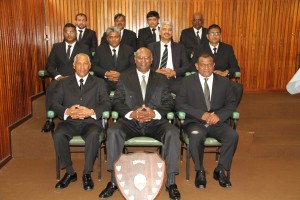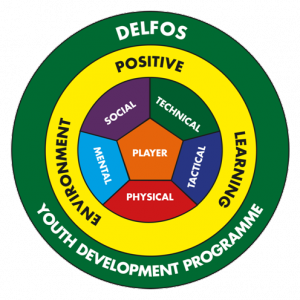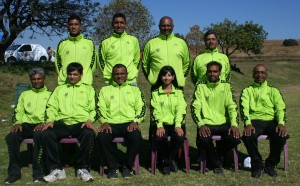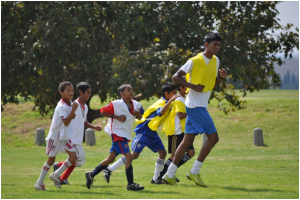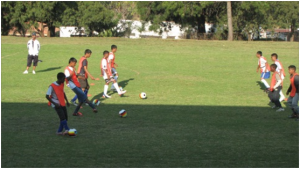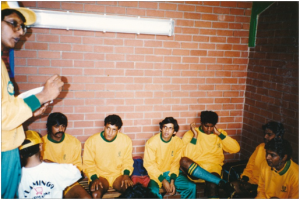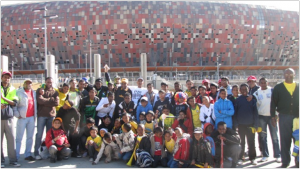ALL ROADS LEAD TO…
Delfos Football Club, a product of the racially segregated location known as “Marabastad” or “Marabi” yet a melting pot of cultures, religions and of song and dance, has become a household name in Tshwane and the Greater Gauteng province, thanks to the effort and commitment of members and officials past and present.
Traditionally a football club, individual members and the club as an institution has always been actively involved at grass root level in various sport, social, religious and community organisations that have played a pivotal role in the formation of the democratic South Africa.
The issue of social responsibility is high on our agenda and we continually implement programs that seek to improve the society we live in.
Our Junior Development Program places emphasis on the enjoyment of football and the development of a person as a whole, hence we have coined the phrase “YOUTH DEVELOPMENT THROUGH FOOTBALL”
Respect, Discipline and a Competitive spirit form an integral part of the culture at Delfos.
Furthermore we pride ourselves on running a professional junior development program in a safe and conducive environment.
Currently the club consists of 7 teams:
Affiliated to the LFA – Laudium Football Association (formerly the PDFA – Pretoria District Football Association established in 1905)
- Under-9
- Under-11
- Under-13
- Under-15
- Under-17
- Senior Team
Affiliated to the FAP – Football Association of Pretoria (formerly the NTCDFA – Northern Transvaal Central District Football Association established in 1901)
- Senior Team
The ethos at the club is to compete at the highest amateur level. The Delfos Golf club was also established in 2005. Plans are afoot to re-establish the Delfos, cricket and volleyball clubs.
Have fun and enjoy playing the beautiful game – NOT FOR THE GLORY BUT FOR THE GAME…
Our coaches share a passion for the game that is transferred through to all the participants.
Players are allowed to express themselves, play without fear of making mistakes, be encouraged to make their own decisions in sessions and discover the enjoyment of football. We are constantly looking to learn from people we meet, allowing our programs to evolve around the core beliefs that Delfos is built on.
We understand that all children learn in different ways and our coaches are trained to deal with all types of personalities and abilities so that each player can achieve their highest level of performance.
Physical
- Take responsibility for looking after your body, what you consume and how you train.
- Players learn specifically how to train their bodies for the demands of the game. Focusing on the fundamental movements of agility, balance, strength, speed and stamina.
- As players get older they learn how their game position can dictate their physical training.
- Players also learn how fuelling and preparing their bodies off the field will give them the best chance on it!
Technical
- By improving your technical ability, you will be able to play with more confidence and become more effective.
- Through the delivery of specific techniques performed, players will learn to dominate 1v1 situations by being able to produce tricks and turns and become more confident with the ball at their feet.
- Players are also taught the fundamental techniques such as dribbling, passing, receiving, finishing, defending, heading and goalkeeping.
Mental
- Developing a winning mentality requires strong character and a positive attitude. The whole environment at a Delfos Coaching session and game is positive.
- Players of all ages have to deal with winning and losing, playing well and making mistakes. We show our players techniques on how to build confidence throughout the different challenges presented in the game.
Social & Community Ethos
- The Delfos environment is a great opportunity for children to develop their social skills, respect and community responsibility.
- Players are encouraged to conduct themselves as respectable and disciplined members of the Delfos Football Club and reach the high standards set by some young professional footballers.
- Regular social interactions with players, parents and supporters are held as we believe that social interactions form an integral part of the process of changing and uniting our societies
Code of conduct
- Attitude
Motivate yourself to give your best.
- Behaviour
Lead by example, be the best person you can.
- Communication
Listen to you parents, elders, teachers and coaches. Always keep an open mind and ask questions.
- Discipline
Be prepared and be punctual. Respect the people, equipment and place where you play.
- Enthusiasm
Give your best at all times and encourage others.
- Fair Play
Learn to win and lose with the same degree of dignity
COACH’S CODE OF CONDUCT
- All Junior players must be given equal playing time.
- Be reasonable in your demands on young player’s time, energy and enthusiasm.
- Teach your players to follow the rules.
- Remember that children participate for pleasure and that winning is only part of the fun.
- Ensure that equipment and facilities meet safety standards and are appropriate to the age and ability of the players.
- Develop team respect for the ability of opponents and for the judgement of officials and opposing coaches.
- Follow the advice of a physician when determining when an injured player is ready to recommence training or competition.
- Keep up to date with the latest coaching practices and the principles of growth and development of children.
- Wherever possible, group players to ensure that everyone has a reasonable chance of success.
- Be sure that the language you use, your physical contact and relationships with the team members are appropriate at all times.
- Encourage the children to comply with disciplinary expectations appropriate to their age and make them aware that bullying or other inappropriate behaviour will not be tolerated at any time.
PLAYER’S CODE OF CONDUCT
- Play by the rules.
- Never argue with an official. If you disagree, have your captain, coach or manager approach the official during a break or after the game.
- Control your temper. Verbal or physical abuse of officials or other players, deliberately distracting or provoking an opponent is not acceptable or permitted in any sport.
- Work equally hard for yourself and/or your team.
- Be a good sport. Applaud all good plays whether they are by your team or the opposition.
- Treat all players as you would like to be treated. Do not interfere with, bully or take unfair advantage of another player.
- Co-operate with your coach, team mates and opponents. Without them there would be no competition.
- Play for the fun of it, and not just to please parents and coaches.
PARENT’S CODE OF CONDUCT
- Remember that children play sport for their enjoyment, not yours.
- Encourage children to participate, do not force them.
- Focus on the child’s efforts and performance rather than winning or losing.
- Encourage children to always participate according to the rules.
- Never ridicule or yell at a child for making a mistake or losing a game.
- Remember that children learn best by example. Applaud good plays by all teams.
- Support all efforts to remove verbal and physical abuse from sporting activities.
- Be sure that the language you use, your physical contact and relationships with the team members are appropriate at all times.
- Respect official’s decisions and teach children to do likewise.
- Encourage your child to comply with disciplinary expectations appropriate to their age and help make them aware that bullying or other inappropriate behaviour will not be tolerated at any time.
- If you know your child is unable to attend a game or training sessions, please let the coach know in advance.
- Show appreciation for volunteer coaches, officials and administrators. Without them, your child could not participate.


